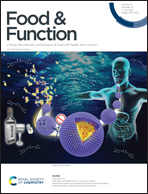Selenium enriched Bacillus subtilis yb-1114246 activated the TLR2–NF-κB1 signaling pathway to regulate chicken intestinal β-defensin 1 expression
Abstract
The aim of this study was to investigate the effects and potential signaling pathway of selenium-enriched Bacillus subtilis (SEBS) on beta defensin 1 (BD1) expression in chicken intestine. Chinese Huainan Partridge chickens (500 individuals) were randomly allocated into five groups, including control, inorganic Se, B. subtilis, SEBS, and a mixture of Se and B. subtilis (Se-BS). After 56 d of feeding, chicken ileal mucous membranes were harvested to detect differences in expression of BD1. The results indicated that BD1 was produced in intestinal crypt cells and secreted into the lumen through the villi brush border. BD1 was up-regulated in distal ileum segments colonized by SEBS and B. subtilis. Chicken primary intestinal crypt cells were cultured and grouped into control, inorganic Se, B. subtilis, SEBS, and Se-BS treatments to identify the receptor of B. subtilis. Results indicated that B. subtilis and SEBS were recognized by toll-like receptor 2 (TLR2), stimulating the NF-κB1 signaling pathway to increase expression of BD-1, which was further enhanced when combined with Se. Pro-inflammatory cytokines TNF-α, IL-1β, and IL-6 were up-regulated with B. subtilis supplementation, and inhibited under the action of Se. In conclusion, B. subtilis and SEBS were recognized by the TLR2 receptor in the ileal mucous membrane, which activated the TLR2–MyD88–NF-κB1 signaling pathway to upregulate BD1 expression. In addition, Se enhanced recognition of B. subtilis and reduced levels of pro-inflammatory factors caused by estrogenic B. subtilis supplementation.



 Please wait while we load your content...
Please wait while we load your content...